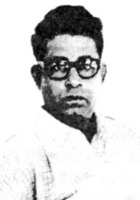Abdul Ghani Hazari
Abdul Ghani Hazari Poems
We the wives of a few bureaucrats
Turn our face to you.
O Lord, save us,
Devastated in relaxation are we,
...
Abdul Ghani Hazari Biography
Abdul Ghani Hazari was a highly respected and popular poet, translator and essayist. For most of his professional life he was a journalist. He is perhaps the best known satirist among Bangladeshi poets. Among the honours he received was the UNESCO Prize for poetry. Birth He was born in the village of Nayagram in pabna. He obtained BA Honours in Philosophy from Calcutta University in 1944. He took admission in MA, but could not complete his studies. Abdul Ghani's career as a journalist began in 1947, shortly before partition, when he joined Alodan, a weekly magazine published from Kolkata, as editor. Journalist Life After 1947 he came to dhaka and was appointed assistant manager of the Jubilee Press. He published Chandrabindu, Mukti (1950) and The Republic. From 1965 to 1968, he worked in different capacities at The Pakistan Observer, Dainik Sangbad, Purbadesh, Chitrali and Parikrama. After the liberation of Bangladesh, he was made administrator of the Observer Group of Publications (1972-73) and chairman of the Newspaper Management Board (1974-1976). Literary Life Apart from his journalistic activities, Abdul Ghani played an active role in establishing and leading various organisations such as Lekhak Sangha, Dhaka Art School (1948) and Diabetic Association. Abdul Ghani was also an urbane and witty poet who revealed the incompatibilities and perversions of urban life. Among his poetical works are Samanya Dhan (1959), Katipay Amlar Stri, Suryer Sindi (1965), Jagrata Pradip (1970). He was also a translator; among his translated works are Svarnagardabh (1964) and Froider Manahsamiksa (1975). Kalpenchar Diary (1976) is a compilation of his belles-letters. He received the UNESCO Award for Katipay Amlar Stri in 1964 and the Bangla Academy Prize for Poetry in 1972.)
The Best Poem Of Abdul Ghani Hazari
Wives Of A Few Bureaucrats
We, the wives of a few bureaucrats,
Turn our faces to you,
O Lord, save us,
Devastated in relaxation are we,
Wives of a few bureaucrats,
O Lord, our husbands are
Divers in the bottomless sea of files
(They alone know what they gather) ,
We are destitutes through family planning:
Time rolls by crushing us.
We, the wives of a few bureaucrats,
From dawn to dusk
On the verge of some noble thought
And the faded pages of fashion journals,
Movie advertisements in dailies,
And nude pictures of health and beauty,
And the sensation of a nearly achieved greatness,
Encroachment of fat in the valley of the waist,
The swelling of the belly, the double chin
Panicky at the breast's decline:
O Lord, we gasp in the mausoleum of fat,
We, the wives of a few bureaucrats.
Our store is full of provisions,
Surplus pocket money in the fold of our pillow,
Helene Curtis in glass drawers,
Anne French milk, astringent, deodorant,
Hand lotion, Revlon,
Christian Dior and Rubenstein —
Obviously middle-aged compensation
From our husbands
For the shortage of warm love.
Proud of the salute of orderlies,
Our husbands are always in the office,
Obstructing others' promotions,
Rejecting applications,
Appending a few dignified signatures
Even on getting back home.
Jealous at the friend's promotion,
Profit and loss of business run under another's name —
And the telephone
The telephone
The telephone.
The Revlon on our lips,
The foundation cream on our face,
The careful beauty spot on our foreheads grow dusty.
The evening invitation gets old and stale.
And then, O Lord,
Thoughts of the second man
Make us restless for a moment.
The old lover is married.
Young adolescents' aunt,
The subordinates' mother,
Granny in the sister's home,
And the evening invitation old and stale.
On the pages of the British magazine
Maggie's amour, Jacqueline's hymn,
Flirtations of Liz Taylor, BB's bust,
And Marilyn's suicide
And suicide
And suicide
And the evening invitation,
And the evening invitation,
And then, O Lord,
Our body insipid at night,
The bloodless moon at the window;
The used body — snoring husband
Sleepless night
And tranquilizer.
O Lord, with no other means left
We turn our faces to you;
Give us some work, mirror in vanity bags,
Foundation and lipstick, and social service.
Savage criticism of kindergartens.
Or the front row seat in ladies' clubs,
Or inauguration of the child clinics
By virtue of our husbands' ranks. We, the wives of a few bureaucrats,
Ask you, O Lord, to give us some work, anything at all
That we may throw ourselves into its abyss.
[Translated from 'Kotipoy Amlar Stri' (Bengali) by Kabir Chowdhury]
